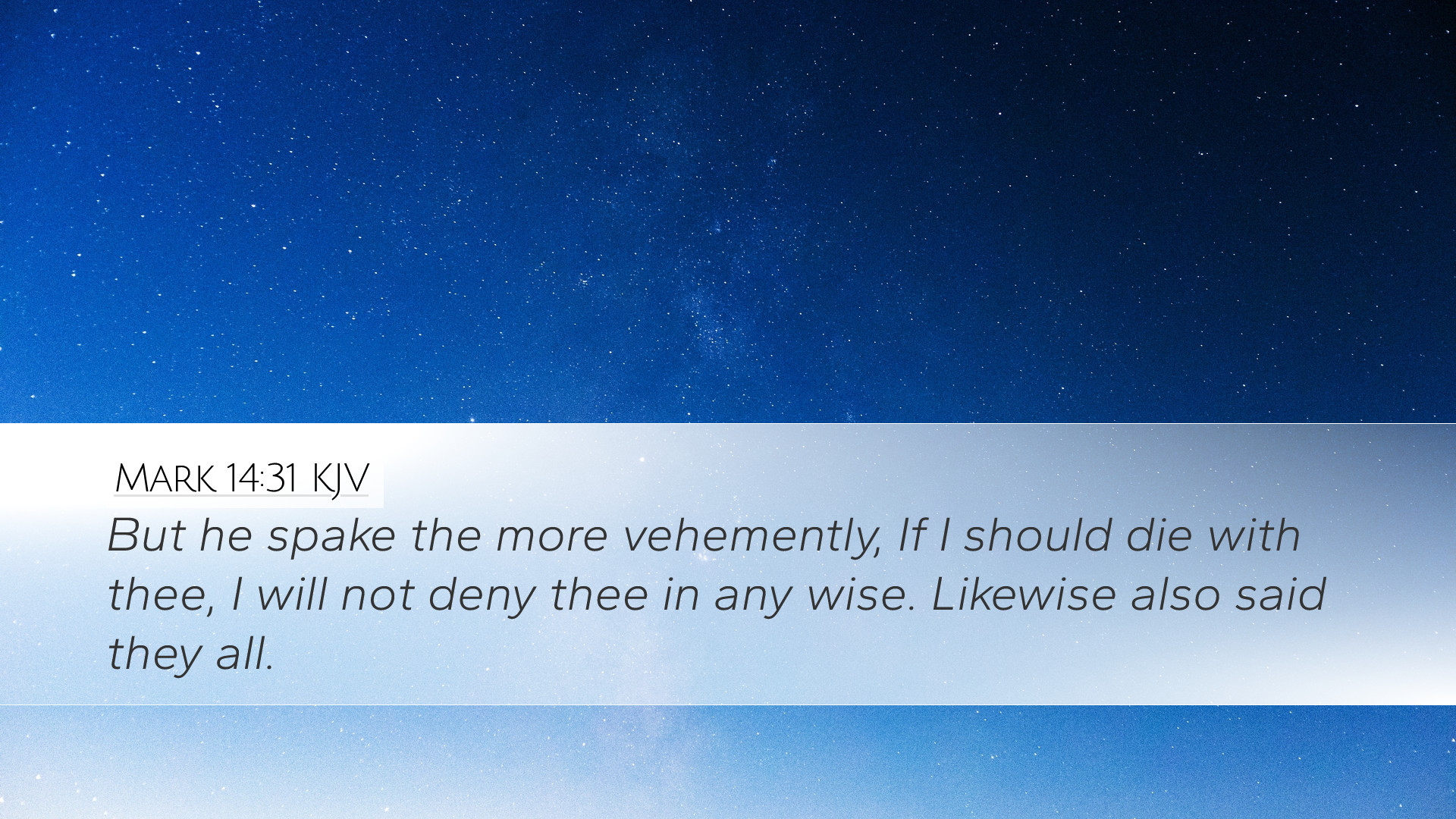Commentary on Mark 14:31
Mark 14:31 captures a pivotal moment in the narrative of Jesus' Passion. This verse reflects the intensity of Peter's declaration, revealing both his fervent commitment and the impending reality of human frailty. In this commentary, insights from Matthew Henry, Albert Barnes, and Adam Clarke are synthesized to provide a comprehensive understanding of the text.
Contextual Background
The setting of Mark 14:31 is crucial for interpreting Peter's bold claim. This occurs during the Last Supper, where Jesus predicts His betrayal and impending crucifixion. The atmosphere is charged with tension and impending betrayal, which heightens Peter's response.
Textual Analysis
Mark 14:31 (ESV): "But Peter said emphatically, 'If I must die with you, I will not deny you.' And they all said the same."
Peter's Emphatic Declaration
Peter’s statement is characterized by strong emotion and conviction. His assertion, “If I must die with you,” indicates a willingness to face death rather than abandon Jesus. Matthew Henry emphasizes the importance of Peter's intentions, depicting them as both noble and misguided. Peter exhibits a deep loyalty but fails to grasp the gravity of the situation.
The Universal Response
The phrase “And they all said the same” underscores a collective yet superficial commitment among the disciples. Albert Barnes points out that while the disciples profess loyalty, their actual faithfulness will be tested shortly. This highlights the human tendency to overestimate one's resolve in the face of trials.
Contrasting Human Weakness with Divine Foreknowledge
In this verse, the contrast between Peter's zeal and God's foreknowledge emerges. Adam Clarke notes that Jesus’ foresight regarding Peter's denial serves as a poignant reminder of human limitations. Although Peter vowed allegiance, Jesus knew the frailty that would lead to betrayal. This divine knowledge underscores God’s understanding of human nature, promoting humility among believers.
Thematic Insights
- Commitment in Trials: This passage invites reflection on how believers often express intentions of loyalty in times of peace, but may falter under pressure.
- The Dangers of Overconfidence: Peter's confidence serves as a warning against assuming one's fidelity without recognizing human vulnerability.
- God's Grace Amidst Failure: Despite the foreseen denial, God's plan encompasses redemption, demonstrating that failure does not exclude one from service in His kingdom.
Application for Believers
Pastors and scholars may draw from Mark 14:31 lessons of humility and dependence on divine strength. While Peter’s fervor is commendable, it becomes imperative to recognize the necessity of God's grace to sustain faithfulness. Believers are encouraged to approach their commitment with honesty about their weaknesses, relying on Christ's strength to uphold them through trials.
Reflections for Pastoral Ministry
In pastoral contexts, this passage is relevant when addressing congregants struggling with their commitments to Christ. The admonition is to foster an environment that encourages transparency about struggles rather than an unrealistic portrayal of unwavering faith. Ministries can focus on teaching about the importance of accountability and reliance on the Holy Spirit.
Theological Implications
Theological reflection on this verse illuminates the nature of discipleship. Peter’s journey illustrates that true discipleship is marked by both bold declarations and honest failures. The assurance of forgiveness and restoration after failure is central to Christian teachings, as modeled in Jesus’ reactions to Peter post-resurrection.
Conclusion
Mark 14:31 invites profound contemplation on themes of loyalty, human weakness, and divine foresight. By engaging with the insights of notable commentary figures, pastors, students, and theologians can cultivate a deeper understanding and application of faith amidst trials. The journey of Peter, marked by loyalty, failure, and eventual restoration, serves as a powerful narrative that resonates with the Christian experience today.


